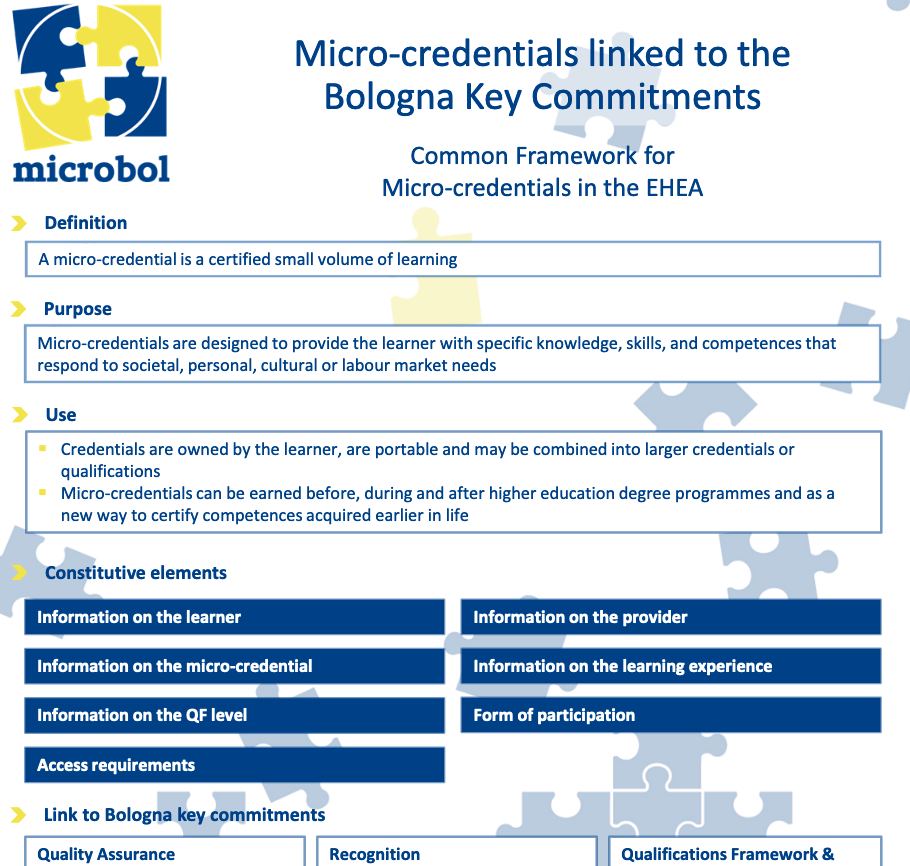Microcredentials linked to the Bologna Key Commitments (Microbol)
The MICROBOL project supported ministries and stakeholders in exploring, within the Bologna Process, whether and how the existing Bologna tools can be used and/or need to be adapted to be applicable to microcredentials. EQAR was an associate partner of this Erasmus+-funded project, coordinated by the Flemish Ministry of Education and Training.
Increased access to education for all learners
The project was linked to the aims of the new Erasmus+ Programme and the European Higher Education Area (EHEA) to increase access to continuous learning for all learners, regardless of age or experience. These learners include regular higher education students, but also all those wanting to improve their knowledge, skills and competences.
To fill the gap between formal education leading to classic degrees and the fast-changing knowledge-development and labour market needs, there is the need to create new flexible ways of learning and teaching such as short learning programmes and micro-credentials. These can be offered through formal or informal education and delivered through online or face-to-face courses.

More about the Microbol project
Report of the MICROBOL project Final Conference
The main conclusion of the MICROBOL project is that the Bologna tools are applicable to micro-credentials and that they could even give a new boost to the full implementation of the Bologna tools and commitments. The MICROBOL framework will serve as the starting point.
Common framework for Micro-credentials in the European Higher Education Area
The framework represents the consensus on micro-credentials reached to this point. It shows how the Bologna key commitments are applicable to micro-credentials, as it zooms in on Quality Assurance, Recognition and Qualifications Framework and ECTS.
Check out the Microbol Framework one-pager here.
Survey Report: Micro-credentials and Bologna Key Commitments – State of play in the European Higher Education Area
This Microbol report, published in February 2021, presents the state of play of micro-credentials in the European Higher Education Area (EHEA) relative to six dimensions: their development, legislation, digitalisation, and the applicability to them of the existing Qualifications Frameworks (QFs) and European Credit Transfer and Accumulation System (ECTS), recognition and Quality Assurance (QA).
Applying the Bologna tools to micro-credentials
The project will engage ministries and stakeholders involved in the Bologna Follow-up Group to explore whether and how the existing EHEA tools can be used and/or need to be adapted to be applicable to micro-credentials.
The project focuses primarily on micro-credentials provided by higher education institutions or in conjunction with them, but also touches upon those entirely provided by companies or non-profit organisations, the system of ‘open badges’ and other bits of ‘micro’-learning, that might be recognised by higher education institutions.
To reach the objective the following activities will be carried out: a desk research followed by various meetings and workshops, bringing governments, experts and stakeholders together to evaluate the current practices and policies relating to microcredentials. Based on the findings of these meetings, a common European framework for microcredentials will be proposed.
- Flemish Ministry of Education and Training – Coordinator
- EUA (European University Association)
- ENQA (European Association for Quality Assurance in Higher Education,
- The Ministry of Education and Culture from Finland
- CIMEA (Italy)
- EQAR – associate partner